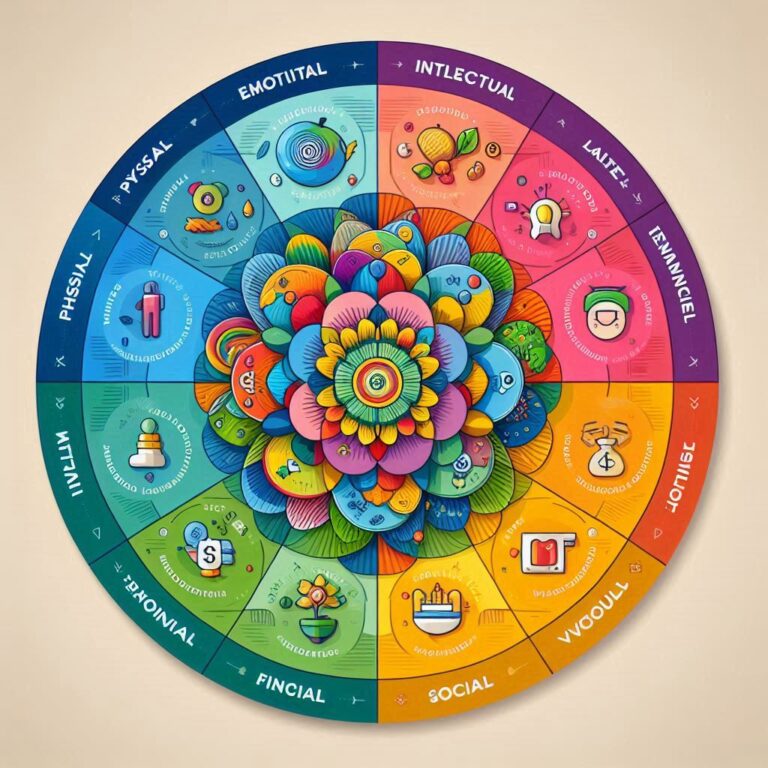8 Essential Dimensions of Wellness
How to Achieve Balance for a Fulfilling Life
Introduction:
Are you feeling overwhelmed by the concept of “wellness” and wondering what it truly means to live a well-balanced life? The journey to complete wellness extends far beyond physical fitness and mental health. In this comprehensive guide, we’ll explore the eight dimensions of wellness that collectively shape your quality of life, providing practical insights on how these interconnected elements can help you achieve harmony and fulfillment in every aspect of your existence.
Ever found yourself wondering what people really mean when they talk about “wellness”? I used to think it was just about hitting the gym and eating salads, but man, was I wrong. Wellness runs so much deeper than that. It’s this messy, beautiful tapestry of different parts of our lives that somehow need to work together.
I spent months researching what actually makes people truly well (not just Instagram-wellness-influencer well), and I’ve discovered there are eight dimensions we need to pay attention to. The tricky part? They’re all connected, so when one area of your life starts falling apart, others tend to follow suit.
Let me walk you through what I’ve learned about these eight dimensions and how they might be showing up in your life right now.
The Whole Wellness Picture: More Than Just Green Smoothies
Wellness isn’t some luxury concept reserved for people with perfect lives and unlimited free time. It’s relevant to all of us, regardless of where we’re starting from. I’ve learned that while most people focus on physical health (like exercise and nutrition) and maybe a bit of mental well-being (like stress management), true wellness touches every corner of our existence.
These eight wellness dimensions don’t operate in silos – they’re constantly influencing each other. When my finances are a mess, my sleep suffers. When my relationships are thriving, suddenly my work feels more meaningful. You probably can’t nail all eight perfectly (I certainly haven’t), but understanding how they work together helps you make better choices about where to focus your energy.
The 8 Essential Dimensions of Wellness
1. Physical Wellness: The Foundation That Supports Everything Else
Let’s start with the obvious one – physical wellness. This is about how you treat your body day to day and whether it’s serving you well both now and in the future. It’s about having the energy and capacity to live your life without your body holding you back.
After talking with several health coaches and fitness experts, I’ve gathered these key components of physical wellness:
- Learning to recognize your body’s signals – like when you’re genuinely hungry versus emotional eating
- Finding physical activities you actually enjoy rather than forcing yourself through workouts you hate
- Developing healthy eating habits that are sustainable, not just crash diets
- Getting comfortable with your body and sexuality (something many of us struggle with)
- Building a healthier relationship with food – no guilt, no shame
- Prioritizing quality sleep and finding personal strategies for stress management
- Working on functional movement – strength, flexibility, and mobility that serves your daily life
- Discovering physical hobbies that bring you joy, not just exercise that feels like punishment
2. Emotional Wellness: Because Feelings Matter, A Lot
I used to think emotional wellness was just about being happy, but it’s so much more complex than that. Emotional wellness means developing a healthy relationship with your full range of emotions and being able to process them without getting stuck.
Through my conversations with therapists and my own personal work, I’ve found these aspects crucial:
- Learning to identify what you’re actually feeling (harder than it sounds!)
- Understanding your needs for connection, love, and belonging
- Building healthy relationships with boundaries that protect your emotional health
- Recognizing when you’re approaching emotional breakdown and reaching out before crisis hits
- Being humble enough to seek professional help when self-help isn’t cutting it
- Creating a network of meaningful social connections that sustain you
- Accepting that emotions like anger, fear, and grief are normal human experiences
- Finding healthy outlets for intense emotions rather than bottling them up
- Developing a reasonably positive mindset without toxic positivity or denying reality
- Building emotional resilience so life’s inevitable hardships don’t completely derail you
- Finding practical techniques to manage stress and anxiety that work for your unique brain
- Honoring your needs for emotional intimacy without becoming dependent on others
3. Intellectual Wellness: Keeping Your Brain Engaged and Growing
I’ve noticed that people who stay curious throughout life seem to maintain a certain vitality that others lose. Intellectual wellness isn’t about academic intelligence – it’s about continuing to develop your thinking capacity throughout your entire life.
Based on cognitive research and lifelong learning principles, these elements stand out:
- Staying open to new ideas and perspectives even as you get older
- Building critical thinking skills that help you evaluate information in our complex world
- Developing mental flexibility to adapt when circumstances change
- Finding ways to solve problems creatively instead of getting stuck
- Adopting a growth mindset that embraces challenges as opportunities
- Exercising your imagination and creative capacity regularly

4. Spiritual Wellness: Finding Meaning Beyond the Day-to-Day
Whether you’re religious or not, spiritual wellness addresses our universal human need for meaning and purpose. It’s about the values that guide your choices and the practices that connect you to something larger than yourself.
From discussions with people across various spiritual traditions and philosophical backgrounds, these components emerge:
- Clarifying your core values and actually living in alignment with them
- Developing ethical frameworks that guide your decisions
- Taking time for self-reflection to continually evolve into your better self
- Contemplating life’s big questions and your unique purpose
- Maintaining hope and optimism even during difficult times
- Finding practices that bring you inner peace – whether prayer, meditation, nature walks, or something else
- Practicing forgiveness (of yourself and others) to release the weight of resentment
- Contributing positively to others’ lives in ways that align with your deepest values
5. Environmental Wellness: Your Surroundings Shape Your Life
I never realized how much my environment was affecting me until I started paying attention. Environmental wellness considers how your surroundings – from your home to the planet – impact your health and well-being.
Environmental scientists and wellness experts point to these key aspects:
- Creating living spaces that support rather than drain your energy
- Making conscious choices about resource consumption
- Learning basic waste management and recycling practices that make sense for your area
- Understanding how environmental factors affect your personal health
- Developing habits for maintaining clean, organized spaces that reduce stress
- Supporting sustainable practices without becoming overwhelmed by eco-anxiety
- Staying informed about climate change while finding practical ways to contribute positively
6. Financial Wellness: Because Money Stress Affects Everything
Money problems keep more people awake at night than almost anything else. Financial wellness isn’t about being rich – it’s about having a healthy relationship with money and financial stability that allows you to meet your needs without constant anxiety.
Financial advisors and researchers highlight these components:
- Working toward reasonable financial freedom that gives you choices and peace of mind
- Understanding your complete financial picture – income, expenses, assets, debts
- Developing practical money management skills that work for your specific situation
- Finding a healthy balance where money concerns don’t consume your entire life
- Planning realistically for major life transitions including retirement
- Distinguishing between mindless consumption and spending that aligns with your values
- Learning basic risk management for financial uncertainties
- Getting clear about what you truly need versus what you simply want

7. Social Wellness: Because Humans Need Connection
We’re hardwired for connection, yet meaningful relationships seem harder to maintain than ever. Social wellness involves creating and nurturing relationships that support and enrich your life.
Sociologists and relationship experts emphasize these elements:
- Building a network of healthy relationships with appropriate boundaries
- Developing social skills to navigate different types of interactions
- Understanding your responsibilities to your communities
- Expanding your awareness of different cultures, beliefs, and perspectives
- Learning to appreciate diversity and bridge differences
- Finding meaningful ways to contribute to others’ well-being
- Creating community connections that provide mutual support
8. Vocational Wellness: Finding Purpose in Your Work
We spend most of our waking hours working, so it matters tremendously. Vocational wellness involves finding work that engages your talents and aligns with your values, whether paid or unpaid.
Career counselors and workplace researchers identify these crucial aspects:
- Exploring your natural abilities, interests, and values related to work
- Continuously developing skills that keep you engaged and marketable
- Finding healthy integration between work and personal life
- Creating meaning through your contributions, regardless of job title
- Aligning your work with your authentic interests and strengths when possible
How These Dimensions Create Your Overall Well-being
I’ve noticed in my own life that these dimensions create a kind of ecosystem – when one area flourishes, it often lifts others. And unfortunately, the reverse is true too. Financial stress can tank your emotional health, which might lead to physical problems like disrupted sleep or comfort eating. It’s a connected system.
Understanding these connections helps you make strategic choices. Sometimes the most effective way to improve one dimension isn’t to focus directly on it but to shore up a different area that’s creating a domino effect of problems.
Real-Life Steps to Improve Your Wellness (That Actually Work)
Forget perfect balance – it doesn’t exist. Instead, think of wellness as a dynamic process of making slightly better choices over time. Here’s what I’ve found actually works:
- Take an honest look at where you stand in each dimension right now
- Pick just one or two areas where small improvements would make the biggest difference
- Make tiny changes you can actually sustain rather than dramatic overhauls
- Pay attention to how changes in one area affect others
- Get specific support for the dimensions you struggle with most
- Check in with yourself regularly and adjust as needed
I’ve learned that wellness isn’t something you achieve once and then check off your list. It’s an ongoing conversation with yourself about what you need in this particular season of life. Some dimensions will need more attention at certain times, and that’s okay.
What dimension of wellness is calling for your attention right now? Even small steps toward better balance can create ripple effects that improve your overall quality of life in surprising ways.

